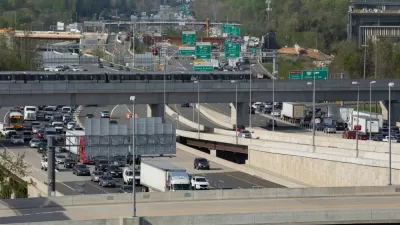The National Capital Region Transportation Planning Board has almost completed the latest version fo the Visualize 2045 long-range transportation plan, but it is already making plans to add a climate plan to the final product.

The National Capital Region Transportation Planning Board (TPB)—which serves as the metropolitan planning organization for the Washington, D.C. region—recently took the drastic step of deciding to completely redo the process with climate change in mind.
"The agency will proceed with the adoption of its current proposal, titled 'Visualize 2045,' by spring next year, but they also voted to start over and adopt a new vision for the region’s transportation system by 2024," according to Pugh.
"The vote to develop a new plan by 2024 that reduces greenhouse gas emissions follows months of advocacy by smart growth and conservation organizations, and pressure from local elected officials to act," explains Pugh of how the dramatic decision came about. Public comments of the current version of Visualize 2045 "overwhelmingly objected to its lack of commitment to regional climate policies," according to Pugh. Instead, the plan represents a "continuation of massive road and highway expansions."
Pugh's article includes more details on the controversy surrounding the plan, and why TPB has had such a hard time meeting its climate goals through two iterations of Visualize 2045. Pugh is optimistic that the climate addendum will do a better job connecting goals to action because of new leadership and commitment at, and around, TPB.
FULL STORY: The region’s long-range transportation plan will be revamped to prioritize ways to curb climate change

Maui's Vacation Rental Debate Turns Ugly
Verbal attacks, misinformation campaigns and fistfights plague a high-stakes debate to convert thousands of vacation rentals into long-term housing.

Planetizen Federal Action Tracker
A weekly monitor of how Trump’s orders and actions are impacting planners and planning in America.

In Urban Planning, AI Prompting Could be the New Design Thinking
Creativity has long been key to great urban design. What if we see AI as our new creative partner?

Pedestrian Deaths Drop, Remain Twice as High as in 2009
Fatalities declined by 4 percent in 2024, but the U.S. is still nowhere close to ‘Vision Zero.’

King County Supportive Housing Program Offers Hope for Unhoused Residents
The county is taking a ‘Housing First’ approach that prioritizes getting people into housing, then offering wraparound supportive services.

Researchers Use AI to Get Clearer Picture of US Housing
Analysts are using artificial intelligence to supercharge their research by allowing them to comb through data faster. Though these AI tools can be error prone, they save time and housing researchers are optimistic about the future.
Urban Design for Planners 1: Software Tools
This six-course series explores essential urban design concepts using open source software and equips planners with the tools they need to participate fully in the urban design process.
Planning for Universal Design
Learn the tools for implementing Universal Design in planning regulations.
planning NEXT
Appalachian Highlands Housing Partners
Mpact (founded as Rail~Volution)
City of Camden Redevelopment Agency
City of Astoria
City of Portland
City of Laramie





























